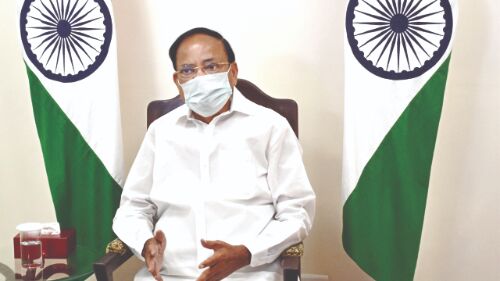Terrorism biggest challenge faced by region, says India

New Delhi: Asserting that terrorism is the biggest challenge the region is facing, India on Monday criticised Pakistan for using it as an "instrument of state policy", and called upon the SCO to combat the menace collectively and enforce internationally recognised legal statutes to comprehensively eradicate safe havens, infrastructure and financial networks supporting terrorism.
In an address at the Council of Heads of Government meeting of the eight-member Shanghai Cooperation Organisation (SCO), Vice President Venkaiah Naidu said the most important challenge faced by the region is terrorism, particularly cross-border terrorism, and that India remained concerned about threats emerging from ungoverned spaces as well.
Chairing the virtual meeting hosted by India, Naidu also talked about ways to recover from adverse economic impact of the COVID-19, and said it was trust and transparency that determine the sustainability of global trade, adding nations must demonstrate their compliance with multilateral rules of trade to remain a part of the system.
"Terrorism is truly the enemy of humanity. It is a scourge we need to collectively combat. We remain concerned about threats emerging from ungoverned spaces and are particularly concerned about states that leverage terrorism as an instrument of state policy. Such an approach is entirely against the spirit and ideals and the charter of the SCO," he said without naming Pakistan.
He said elimination of this threat will help the countries realise shared potential and create conditions for stable and secure economic growth and sustainable development.
The vice president also called upon SCO member states to enforce internationally recognised legal statutes to comprehensively eradicate safe havens, infrastructure and financial networks supporting terrorism, a statement issued by Naidu's office said.
A joint communique issued at the end of the 19th summit of SCO Council of HoG meeting said Kazakhstan, Kyrgyzstan, Pakistan, Russia, Tajikistan and Uzbekistan reaffirmed their support for China's 'One Belt, One Road' (OBOR) initiative and noted the ongoing work on joint implementation of the project.
India has been opposing the project as the China-Pakistan Economic Corridor (CPEC), which is part of the OBOR, passes through Pakistan-occupied-Kashmir (PoK).
Secretary West in the Ministry of External Affairs Vikas Swarup said the meeting was attended by prime ministers of Russia, China, Kazakhstan, Kyrgyzstan, Tajikistan and Uzbekistan while Pakistan was represented by its parliamentary secretary for foreign affairs.
Asked about Pakistan Prime Minister Imran Khan skipping the meeting, Swarup at a media briefing said the answer can only be given by Islamabad as it is for a country to decide on the level of participation.
"As far as we are concerned, we were chairing today's summit. We upgraded our level of participation from prime minister to vice president. Pakistan can only tell the reason about the level of its participation," he said.
Responding to another question on whether Pakistan would join various initiatives proposed by India at the SCO, Swarup said it was entirely up to that country to decide but noted that the SCO charter allows other member countries to take particular cooperation forward with the exclusion of the one country which is opposing it.
Asked whether China and Pakistan's difficult bilateral ties with India will have any impact on the grouping, Swarup said "if the member countries have the will, I am sure we can all find common ground."



